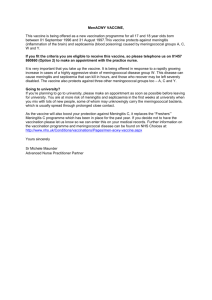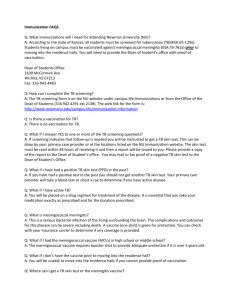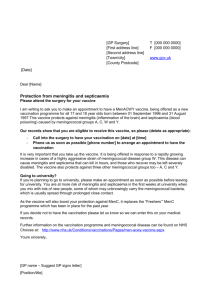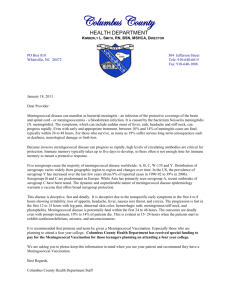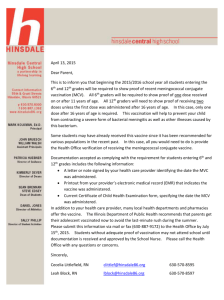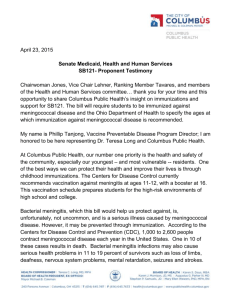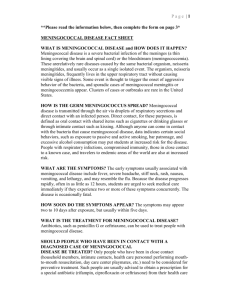Information about Meningococcal Disease and Vaccination and
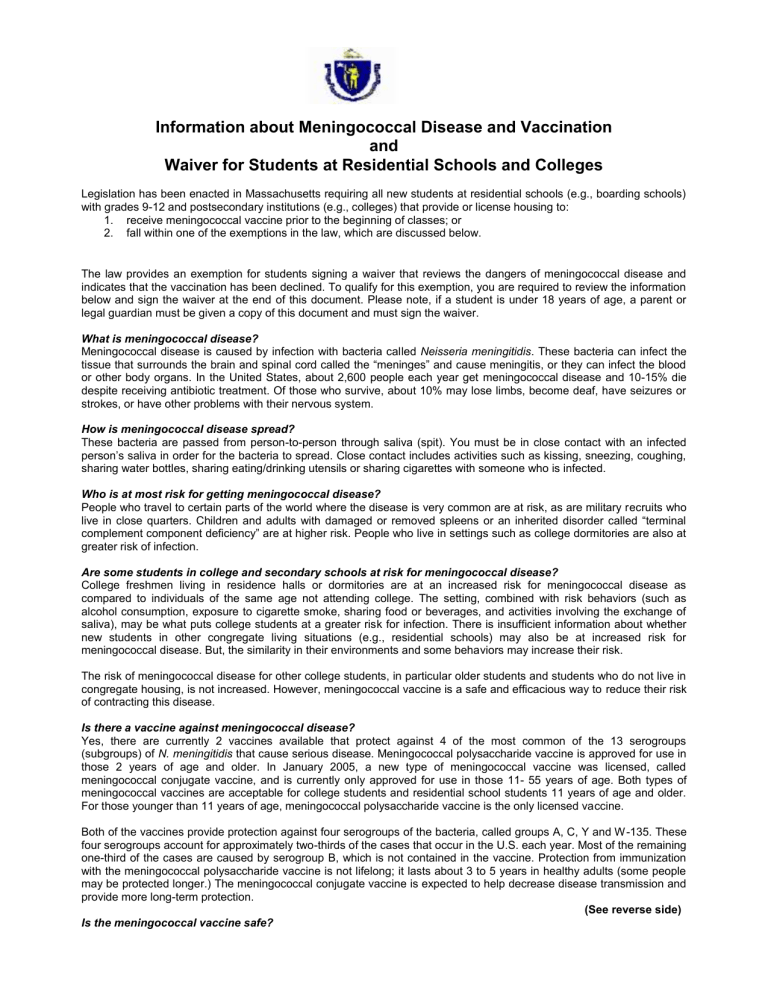
Information about Meningococcal Disease and Vaccination and
Waiver for Students at Residential Schools and Colleges
Legislation has been enacted in Massachusetts requiring all new students at residential schools (e.g., boarding schools) with grades 9-12 and postsecondary institutions (e.g., colleges) that provide or license housing to:
1. receive meningococcal vaccine prior to the beginning of classes; or
2. fall within one of the exemptions in the law, which are discussed below.
The law provides an exemption for students signing a waiver that reviews the dangers of meningococcal disease and indicates that the vaccination has been declined. To qualify for this exemption, you are required to review the information below and sign the waiver at the end of this document. Please note, if a student is under 18 years of age, a parent or legal guardian must be given a copy of this document and must sign the waiver.
What is meningococcal disease?
Meningococcal disease is caused by infection with bacteria called Neisseria meningitidis . These bacteria can infect the tissue that surrounds the brain and spinal cord called the “meninges” and cause meningitis, or they can infect the blood or other body organs. In the United States, about 2,600 people each year get meningococcal disease and 10-15% die despite receiving antibiotic treatment. Of those who survive, about 10% may lose limbs, become deaf, have seizures or strokes, or have other problems with their nervous system.
How is meningococcal disease spread?
These bacteria are passed from person-to-person through saliva (spit). You must be in close contact with an infected person’s saliva in order for the bacteria to spread. Close contact includes activities such as kissing, sneezing, coughing, sharing water bottles, sharing eating/drinking utensils or sharing cigarettes with someone who is infected.
Who is at most risk for getting meningococcal disease?
People who travel to certain parts of the world where the disease is very common are at risk, as are military recruits who live in close quarters. Children and adults with damaged or removed spleens or an inherited disorder called “terminal complement component deficiency” are at higher risk. People who live in settings such as college dormitories are also at greater risk of infection.
Are some students in college and secondary schools at risk for meningococcal disease?
College freshmen living in residence halls or dormitories are at an increased risk for meningococcal disease as compared to individuals of the same age not attending college. The setting, combined with risk behaviors (such as alcohol consumption, exposure to cigarette smoke, sharing food or beverages, and activities involving the exchange of saliva), may be what puts college students at a greater risk for infection. There is insufficient information about whether new students in other congregate living situations (e.g., residential schools) may also be at increased risk for meningococcal disease. But, the similarity in their environments and some behaviors may increase their risk.
The risk of meningococcal disease for other college students, in particular older students and students who do not live in congregate housing, is not increased. However, meningococcal vaccine is a safe and efficacious way to reduce their risk of contracting this disease.
Is there a vaccine against meningococcal disease?
Yes, there are currently 2 vaccines available that protect against 4 of the most common of the 13 serogroups
(subgroups) of N. meningitidis that cause serious disease. Meningococcal polysaccharide vaccine is approved for use in those 2 years of age and older. In January 2005, a new type of meningococcal vaccine was licensed, called meningococcal conjugate vaccine, and is currently only approved for use in those 11- 55 years of age. Both types of meningococcal vaccines are acceptable for college students and residential school students 11 years of age and older.
For those younger than 11 years of age, meningococcal polysaccharide vaccine is the only licensed vaccine.
Both of the vaccines provide protection against four serogroups of the bacteria, called groups A, C, Y and W -135. These four serogroups account for approximately two-thirds of the cases that occur in the U.S. each year. Most of the remaining one-third of the cases are caused by serogroup B, which is not contained in the vaccine. Protection from immunization with the meningococcal polysaccharide vaccine is not lifelong; it lasts about 3 to 5 years in healthy adults (some people may be protected longer.) The meningococcal conjugate vaccine is expected to help decrease disease transmission and provide more long-term protection.
Is the meningococcal vaccine safe?
(See reverse side)
A vaccine, like any medicine, is capable of causing serious problems such as severe allergic reactions. The risks associated with receiving the vaccine are much less significant than the risks that would arise in a case of meningococcal disease. Getting meningococcal vaccine is much safer than getting the disease. Some people who get meningococcal vaccine have mild side effects, such as redness or pain where the shot was given. These symptoms usually last for 1-2 days. A small percentage of people who receive the vaccine develop a fever. The vaccine can be given to pregnant women.
Is it mandatory for students to receive meningococcal vaccine prior to entering secondary schools or colleges that provide or license housing?
Massachusetts law (MGL Ch. 76, s.15D)) requires new students at residential schools (e.g., boarding schools) with grades 9-12 and new full- and part-time, undergraduate and graduate students in degree-granting programs at postsecondary institutions (e.g., colleges) that provide or license housing to receive meningococcal vaccine. At affected institutions, the new requirements apply to all new students, regardless of grade (including grades pre-K through 8), year of study, and whether or not they reside in school- or campus-related housing. Beginning in August 2005, all new students at these institutions must provide documentation of having received meningococcal vaccine (within the last 5 years) at least 2 weeks prior to the beginning of classes, unless they qualify for one of the exemptions allowed by the law.
Students may begin classes without a certificate of immunization against meningococcal disease if: 1) the student has a letter from a physician stating that there is a medical reason why he/she can’t receive the vaccine; 2) the student (or the student’s parent or legal guardian, if the student is a minor) presents a statement in writing that such vaccination is against his/her sincere religious belief; or 3) the student (or the student’s parent or legal guardian, if the student is a minor) signs the waiver below stating that the student has received information about the dangers of meningococcal disease, reviewed the information provided and elected to decline the vaccine.
Consideration is being given to amending the law regarding the students to be covered by the requirement. When and if the law is amended, regulations regarding meningococcal vaccination may change.
Where can a student get vaccinated?
Students and their parents should contact their healthcare provider and make an appointment to discuss meningococcal disease, the benefits and risks of vaccination, and the availability of this vaccine. Schools and college health services are not required to provide you with this vaccine.
Where can I get more information?
•
Your healthcare provider
• The Massachusetts Department of Public Health, Division of Epidemiology and Immunization at
(617) 983-6800 or www.mass.gov/dph
• Your local health department (listed in the phone book under government)
Waiver for Meningococcal Vaccination Requirement
I have received and reviewed the information provided on the risks of meningococcal disease and the risks and benefits of meningococcal vaccine. I understand that Massachusetts’ law requires students enrolled at secondary schools, colleges and universities that provide or license housing to receive meningococcal vaccinations, unless the students provide a signed waiver of the vaccination or otherwise qualify for one of the exemptions specified in the law.
Please check the appropriate box below.
□ After reviewing the materials above on the dangers of meningococcal disease, I choose to waive receipt of meningococcal vaccine.
□
-OR-
Due to the shortage of meningococcal vaccine, I was unable to be vaccinated.
Student Name:
Student ID or SSN:
Signature:
Date of Birth:
Date:
(Student or parent/legal guardian, if student is under 18 years of age)
Provided by: Massachusetts Department of Public Health / Division of Epidemiology and Immunization / 617-983-6800 MDPH
Meningococcal Information and Waiver Form
June 2006
